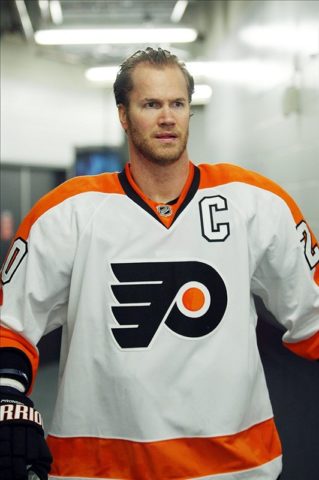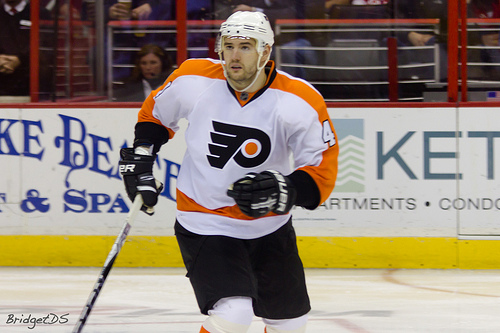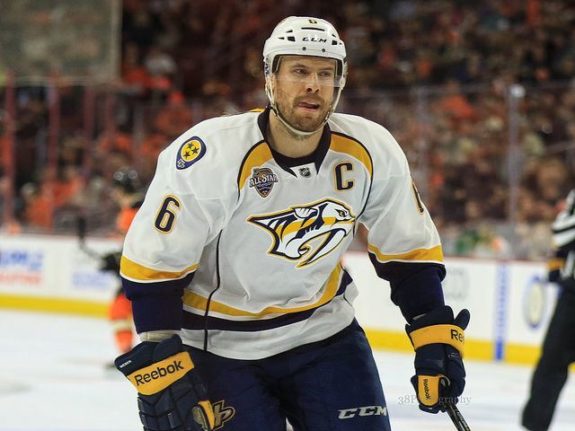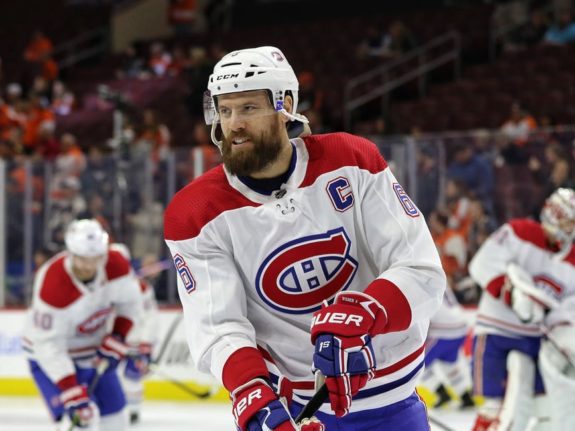Offer sheets in professional sports are not a common occurrence. Normally, unrestricted free agency is the route most teams go in the offseason when trying to add talent. Offer-sheeting restricted free agents does have its history though.
The Philadelphia Flyers have actually done it a couple of times already, the first being when they put an offer sheet in for Vancouver Canucks center Ryan Kesler. The second time happened on July 19, 2012, when they targeted former Nashville Predators defenseman and captain Shea Weber.
Let’s Make a Deal
Heading into the 2012 NHL offseason, the Flyers were in a tough spot on defense. One of their top guys, Chris Pronger, had dealt with injury problems the previous year, getting hit in the eye and dealing with a concussion. He only suited up for 13 games, tallying one goal and producing 11 assists.

There was speculation at the time Pronger would not return to the club, putting the Flyers front office including general manager Paul Holmgren in a situation. They needed another name to help defender Kimmo Timonen lead on the blue line for the upcoming 2012-13 campaign. It also did not help that other Flyers defenseman Matt Carle left to go back for his second stint with the Tampa Bay Lightning, signing a six-year deal with the club worth $33.5 million.
Related: Flyers Showdown – Lindros vs. Clarke
Holmgren addressed the position earlier in June, trading left winger James van Riemsdyk to the Toronto Maple Leafs for defenseman Luke Schenn. They needed to do more though, and a potential splash was needed of some sort.
Free-agent options dwindled including top defenseman-on-the-market Ryan Suter. There was a bidding war among plenty of teams for his services, but he chose to sign alongside forward Zach Parise with the Minnesota Wild. With blue line options becoming more limited, Holmgren figured he would take a different route to solve his new defender dilemma.
That is when he reached out to Nashville restricted free agent Weber. Together, both sides came up with and agreed upon a 14-year deal worth a total of $110 million. It was the first NHL offer sheet since the San Jose Sharks franchise and Chicago Blackhawks defenseman Niklas Hjalmarsson agreed on a four-year deal worth $14 million. This occurred back in 2010, and the Blackhawks matched the offer sheet, keeping him in The Windy City.
Lineup Projection
The 2012-13 Flyers defense consisted of Timonen, Andrej Meszaros, Braydon Coburn, Luke Schenn, Erik Gustafsson, Bruno Gervais, Kurtis Foster, Nicklas Grossmann, Brandon Manning, Oliver Lauridsen, Kent Huskins, and Andreas Lilja.

Weber would’ve slid in right off the top, playing with a guy like Timonen who he was teammates with when they both were with the Predators. He would’ve become the face to run the defense, the same way that Pronger did when he was there. Weber had put up solid numbers up until that point, and he had a productive season during the lockout-shortened 2012-13 season.
- 2005-06: two goals and eight assists for 10 points in 28 games
- 2006-07: 17 goals and 23 assists for 40 points in 79 games
- 2007-08: six goals and 14 assists for 20 points in 54 games
- 2008-09: 23 goals and 30 assists for 53 points in 81 games
- 2009-10: 16 goals and 27 assists for 43 points in 78 games
- 2010-11: 16 goals and 32 assists for 48 points in 82 games
- 2011-12: 19 goals and 30 assists for 49 points in 78 games
- 2012-13 (lockout-shortened): nine goals and 19 assists for 28 points in 48 games
He could’ve been matched up with either Timonen, Coburn, or Meszaros if head coach Peter Laviolette wanted to roll with the left-handed and right-handed routine.
One of Weber’s biggest strengths throughout his entire career was his cannon of a shot. He eventually had the NHL’s hardest shot during the All-Star Skills Challenge multiple years in a row. Having someone like Coburn, Timonen, or Meszaros to set Weber up for a one-time shot on a power play (or even at full strength) is something Flyer fans would’ve gotten excited about for a long time. Weber was used to having that setup in Nashville when he and Suter had been linemates.

Weber also would’ve been a top-notch power-play quarterback for the squad. Guys like Claude Giroux, Jakub Voracek, Wayne Simmonds, and Brayden Schenn (Luke’s brother) would’ve benefited superbly from having Weber dishing those guys the puck. He would’ve been another weapon that could burn opponents.
Overall, when discussing the on-ice product, bringing in Weber would’ve enhanced the talent around him, and made the Flyers that much more competitive of an organization. They ended up just missing the postseason in 2012-13, slotting tenth in the Eastern Conference and fourth in what was the Atlantic Division at the time.
Weber had the firepower to move them into a playoff spot that year, even if just making it in at the number eight position. He is a special kind of a player who would’ve changed the energy around the team, and the leadership he would’ve brought to that locker room would’ve been game-changing (Weber had been the Predators’ captain for around two years in 2012).
The Fallout
Nashville matched Philadelphia’s offer sheet for Weber. He was staying in the Music City for the time being. It continued the issue on defense that the Flyers were trying to resolve, and the organization would have to find another avenue to fix it.
Related: NHL’s Top 5 Centers of the Decade
The Flyers in the long run dodged a bullet by Nashville matching the offer sheet. As Weber continues getting older, the more of a burden that contract becomes. Eventually, the Predators wanted to get the deal off their books and made a blockbuster trade during the summer of 2016.

They dealt Weber to the Montreal Canadiens in exchange for defenseman P.K. Subban. It was a move that shocked the hockey world, a day that also included Taylor Hall getting traded to the New Jersey Devils for defenseman Adam Larsson, and Steven Stamkos re-signing with the Tampa Bay Lightning after speculation he might head to unrestricted free agency.
Another element of the Weber offer sheet deals with what Philadelphia would’ve given up for his services. Based on the contract both sides agreed to, if Nashville hadn’t matched, the Flyers would’ve owed four first-round draft picks.
Latest Flyers Content:
- Flyers’ Wells Fargo Center Set to Undergo Name Change
- Flyers 2024 Draft Pick Austin Moline Heading to BCHL & NCAA
- Flyers’ Matvei Michkov’s Drive Is His Biggest Asset
- 5 Flyers Milestones to Monitor in 2024-25
- NHL Rumors: Oilers, Red Wings, Flyers
Obviously, Weber could’ve possibly affected where the Flyers slotted in the following four years, but based on who they actually drafted, the Predators could’ve walked away with defenseman Samuel Morin (2013), defenseman Travis Sanheim (2014), defenseman Ivan Provorov or forward Travis Konecny (2015), and forward German Rubtsov (2016). That is a lot of young star power to give up, considering what these talents have become. That is not even factoring in the potential of what these guys can become when they hit the prime of their careers.
Weber would have given Philadelphia a stellar replacement for Pronger for a few seasons, and we can all only guess what the differences would have been in how the team performed. However, that contract would have hindered the team on the salary cap long-term, especially provided a team like the Canadiens would not have wanted to take that contract on in the future.

A good portion of youth who have helped mold the current Flyers into a top team in the Eastern Conference would also not currently be on the roster because of the return, and today’s team might actually be further back from being as competitive had the Predators declined to match. Offer-sheeting Weber sacrificed the future for what was the present then. It is unknown how the Flyers would’ve done over the course with Weber in the arsenal, but looking at how history has gone since Nashville matched the offer sheet, Philadelphia may be better off without him.
